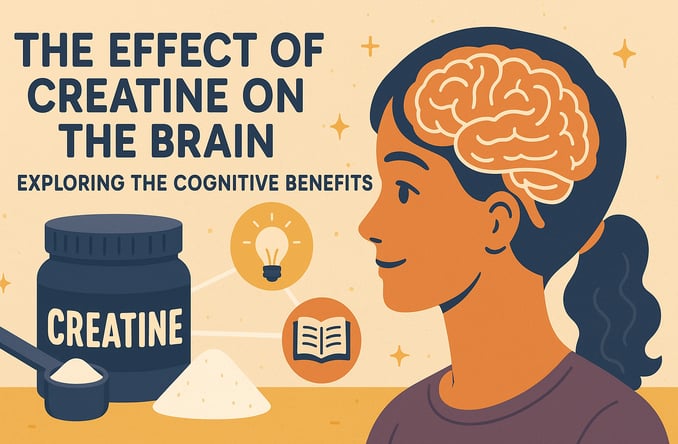The Effect of Creatine on the Brain: Exploring the Cognitive Benefits
The cognitive benefits of creatine supplementation can be attributed to several pivotal mechanisms that enhance brain function...
4/17/20254 min read


Understanding Creatine: What It Is and How It Works
Creatine is a naturally occurring compound found in small amounts within certain foods and synthesized in the human body, primarily in the liver, kidneys, and pancreas. The production of creatine involves three key amino acids: arginine, glycine, and methionine. It is predominantly stored in skeletal muscles, where it plays a vital role in the production of adenosine triphosphate (ATP), the primary energy currency of the cell. This process is critical not only for muscular contraction but also for various cellular processes throughout the body.
The intake of creatine can also be supplemented through dietary sources, particularly from animal products such as red meat and fish. For those who follow a vegetarian or vegan diet, creatine supplementation may be of particular benefit, as these dietary patterns provide little to no creatine. Over the years, creatine has gained significant recognition for its efficacy in enhancing athletic performance and muscle mass, leading its popularization among athletes and fitness enthusiasts.
Historically, the use of creatine as a performance enhancer dates back to the early 1990s, when athletes discovered that supplementation could boost physical endurance, strength, and recovery following intense training. However, emerging research has begun to reveal that the benefits of creatine extend beyond muscle dynamics to potential cognitive enhancements. Studies suggest that creatine may play a crucial role in supplying energy to brain cells, thereby potentially improving cognitive functions, including memory and information processing.
This exploration into the biochemical nature of creatine, its role in muscle energy metabolism, and its historical context sets the stage for a broader understanding of its implications, particularly concerning cognitive health. As researchers continue to unlock the potential benefits of creatine on brain function, it is becoming increasingly clear that this compound may have utility that transcends conventional applications in sports and fitness.
Cognitive Functions Enhanced by Creatine
Recent research has highlighted various cognitive functions that may be positively influenced by creatine supplementation. One of the primary areas of enhancement is memory. Studies have shown that individuals who supplement with creatine demonstrate significant improvements in both short-term and long-term memory tasks. The mechanism behind this enhancement is believed to involve creatine's role in ATP synthesis, which provides the energy required for cellular processes, including those associated with memory retention and recall.
Moreover, attention span is another cognitive function that can be improved through creatine supplementation. Research involving athletes and non-athletes alike has indicated enhanced focus and concentration for tasks requiring sustained attention. This is particularly relevant in high-stakes environments where quick decision-making is critical, underscoring the potential benefits of creatine for individuals seeking greater mental clarity during demanding situations.
Problem-solving abilities have also been a focal point in studies exploring the cognitive benefits of creatine. In experimental settings, participants taking creatine supplements have shown greater efficacy in navigating complex problem-solving tasks. This suggests that creatine may enhance not just the speed but also the quality of cognitive processing, leading to more effective solutions being identified. Such findings are particularly encouraging for older adults and those experiencing cognitive decline, as the support of cognitive functioning can play a pivotal role in daily operations and overall quality of life.
In summary, the cognitive functions of memory, attention, and problem-solving appear to be enhanced through creatine supplementation. These improvements have been documented across various populations, illustrating creatine's potential as a supplement not only for physical performance but also for cognitive health. Further studies are necessary to fully understand the implications of these findings and to explore the long-term effects of creatine on brain function.
Mechanisms Behind Creatine's Cognitive Benefits
The cognitive benefits of creatine supplementation can be attributed to several pivotal mechanisms that enhance brain function. One of the primary ways creatine exerts its effects is by enhancing adenosine triphosphate (ATP) production. ATP serves as the fundamental energy currency in the brain, fueling various processes such as neurotransmitter synthesis, neuronal signaling, and overall cellular function. By increasing the availability of ATP, creatine supplementation helps ensure that neurons can meet their energy demands, particularly during periods of high cognitive workload or stress.
Additionally, creatine has been shown to exhibit neuroprotective properties. Studies suggest that creatine may help shield brain cells against oxidative stress and excitotoxicity—both of which can lead to neuronal damage and neurodegenerative conditions. This protective action is particularly relevant in age-related cognitive decline and in various neurological disorders, where maintaining neuronal integrity is crucial for sustaining cognitive function. By mitigating these risks, creatine may contribute to enhanced mental clarity and improved cognitive performance over time.
Moreover, creatine may influence neurotransmitter levels within the brain. Neurotransmitters such as dopamine and glutamate are critical for mood regulation and cognitive processes, including memory and learning. Evidence indicates that creatine supplementation can increase the availability of these neurotransmitters, potentially resulting in better mood and improved cognitive capacity. This multifaceted approach—boosting energy production, providing neuroprotection, and enhancing neurotransmitter levels—forms the foundation of creatine’s cognitive benefits. As scientists continue to explore these mechanisms, it becomes increasingly clear that creatine is more than just a performance enhancer; it holds significant promise for cognitive health as well.
Dosage, Safety, and Recommendations for Use
When considering the cognitive benefits of creatine supplementation, understanding the appropriate dosage is paramount. Research typically suggests a loading phase of 20 grams per day for 5-7 days, followed by a maintenance dose of 3 to 5 grams daily. This regimen has been shown to effectively increase brain creatine levels, thereby potentially enhancing cognitive function. However, it is crucial to note that individual responses to creatine may vary, and determining the most effective dosage might require personal adjustment over time.
Regarding safety, creatine is generally recognized as safe for most individuals when taken as directed. Studies indicate that it does not adversely affect kidney function in healthy individuals when consumed in recommended dosages. Despite some misconceptions surrounding creatine supplementation, such as fears of weight gain or dehydration, research shows that these effects are typically minimal and manageable. Weight gain, if experienced, often results from increased water retention in muscle tissue rather than fat accumulation, which may not be a concern for cognitive enhancement.
It is also important to highlight specific recommendations for different populations. For students engaged in demanding academic tasks, creatine supplementation may bolster cognitive stamina and improve memory retention. Older adults, experiencing natural declines in cognitive abilities, might find creatine beneficial in maintaining mental clarity and focus. Additionally, individuals in high-stress environments—such as professionals in fast-paced jobs—may also experience enhanced cognitive resilience through creatine use. As with any supplement, it is advisable to consult a healthcare professional before starting creatine, especially for those with preexisting medical conditions. This will ensure that supplementation aligns with personal health needs and safety parameters, paving the way for informed and effective use of this cognitive enhancer.
Buy our recommended creatine here https://amzn.to/3G0bBwE
